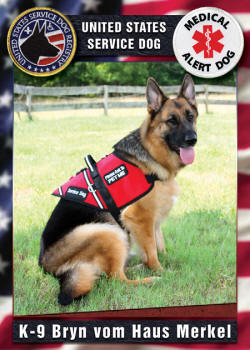|
Scroll WAY down for
Full Navigation
Basic Navigation on header |
|
|
COURAGE - CHARACTER - PREDICTABILITY
Show
puppies by Anatomy; Loyal Companions
and Protection by Nature; Health and Longevity by good
genetics; and proven by Health
Testing Certifications. Brought to you by a
thoughtful knowledgeable trusted
breeder of over 45 years.
Breeders of the finest quality Schutzhund/IPO
titled & Breed Surveyed German Shepherds in the United
States. Our breeding
program maintains
the integrity of the
German Shepherd's heritage to preserve the ideal human-canine bond.
"BREEDING HEALTHY DOGS BY DESIGN"
Our Merkel Geneology is from
Haßloch, Germany
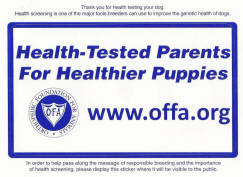
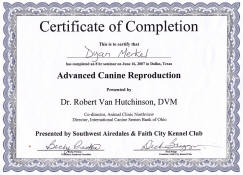
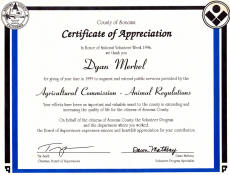


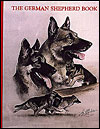 
We are published in these books
BREEDER
QUALIFICATIONS:
KENNEL NAME:
Haus Merkel
Breeder Name: Dyan
Merkel
Website:
http://www.hausmerkel.com
Location: North
Texas
Contact Info:
vhmerkel@yahoo.com
214-755-5755
HEALTH TESTS:
Hip/Elbow
Certifications: Yes
Degenerative Myopathy
Certifications: Yes
Thyroid tests: Yes
CERF tests: No
TRAINING:
Titles/certifies
breeding stock in
discipline?: Yes
BREEDING STOCK:
Raises breeding
stock from
puppies:
Yes
Titles dogs bred on
premise: Yes
Imports titled
breeding stock: Yes
Buys from other
Breeders: NO
MORE!
SCHUTZHUND/IPO:
Has trained in
Schutzhund: Yes
HOT from puppy to
SchH3: Yes
HOT and bred to
SchH3: Yes
CONFORMATION/BREED
SURVEY:
Show ratings: Yes
Breed
survey: Yes
BREEDER
ACCOMPLISHMENTS:
V Putz vom Haus
Merkel SchH3, Kkl 1a
V Ulla vom Haus
Merkel SchH3, Kkl 1a
V Zessa vom Haus
Merkel SchH2, IPO3,
Kkl1a
V Riesa vom Haus
Merkel SchH2, Kkl 1a
V Puma vom Haus
Merkel SchH2, Kkl 1a
V Emma vom Haus
Merkel SchH1, Kkl 1a
SG Wickie vom Haus
Merkel IPO1 a
SG Vessa vom Haus
Merkel IPO1 a
SG1 Clar vom Haus
Merkel SchH1 a
Ch Merkel's Opium
SchH1
V Merkel's Arletta
SchH1, a
SG, VP2 Nixe vom Haus
Merkel BH, AD, a
SG Feli vom Haus
Merkel BH, AD, a
Ch Merkel's Leica
UDT, OFA
Merkel's Leibchen
Shiloh UDT, OFA
Ch Merkels Sangria
UDT, OFA
United States
Grand Victrix
Ch
Merkels Vendetta ROM, OFA
Ch Merkel' Quaestor
CD, ROM, OFA
Ch Merkel's Essence
UD, OFA
Merkel's Coda vom
Jennerick CDX, OFA
National
Certified Search &
Rescue
Lieb vom Haus Merkel
OFA,
National
Obedience
Winner
Ch Merkel's Cut Up
of Timmee UDT, OFA
Certified United
States
Service Dog
Bryn vom Haus Merkel
CGC, OFA
Certified United
States
Service Dog
Fred vom Haus
Merkel
Ch Merkel's The
Cutting Edge OFA
Ch Merkel's Virtual
Reality OFA
Ch Merkel's Tequila
CD, OFA
Ch Merkel's Sante Fe
OFA
Merkel's Spellbound
ROM,OFA
Merkel's Emma ROM ,
OFA
Merkel's Estes CD,
near ROM
2009 Annual Achievement Award Recipient
Ch Merkel's Heart's are Wild
CDTDTC HIC CGC
TDI
OFA
Ch Merkel's Heart to
Heart CD, OFA
PRODOMINANT LINES
USED:
World Sieger Larus von Batu
SchH3 Kkl 1a
World Sieger Zamp vom Thermodos
SchH3, Kkl 1
World Sieger Yasko vom
Farbenspiel SchH3,Kkl 1a
VA Dux della
Valcuvia SchH3,
Kkl1a
Kirschental
WRITTEN GUARANTEE:
Yes
EDUCATION
AVAILABLE:
Yes
LIFETIME
SUPPORT:
Yes
YEARS AS BREEDER:
46
|
S I T E
N A V I G A T I O N
About our 56 years in the Breed
•
Our German Shepherd Males
•
Our German Shepherd Females •
Compare with other Breeders
•
Our References
•
German Shepherd Puppies for Sale
•
Older Puppies/Teenagers for Sale
•
Adult Females for Sale
•
Adult Males for Sale
•
Puppy Pricing/Contract
•
MORE LINKS:
Neutering your puppy
•
Deposit
•
Pricing,
Contract
•
Adult &Young
Males for Sale
•
Adult &Young
Females for Sale
•
Our German Shepherd Stud Dogs
•
Breeding Requirements for Stud
•
Puppy Mill Article •
German Shepherd Rescues •
Memorials
•
Articles
•
OFA •
Classifieds
•
Dog Food Analysis •
Worming &
Vaccination Schedule •
OUR OTHER PETS•
Excellent Link to pet/health videos
•
Any health care links located here
are NOT to replace a veterinarian visit; please take your dog to a vet
immediately at any sign of odd behavior or any symptoms of illness or
injury. Call your vet and describe your dog's symptoms with any of your
concerns about the dog's well-being. Your veterinarian may discover
changes in your dog's health that you have overlooked. It is always
better to err on the side of caution
HEALTH ARTICLES:
von Willebrand
Disease •
MORE ARTICLES:
Other Links
•
Links
•
Contact
•
Add your Link •
Members of
GSDCA
•
WDA
•
Schutzhund USA
•
My beloved mother
(Dorothy Conner Merkel
Obituary)
Love, kindness & laughter was her gift to all.
Always on my mind forever in my heart!
|
THIS IS WHAT WE FEED & RECOMMEND

Click photo to go to their site
VICTOR
SELECT HI-PRO PLUS
Calorie Content (calculated):
ME 3894 kcal/kg;429 kcal/cup
Formula for Active Dog &
Puppies contains high levels
of Proteins and Energy with only 30%
carbohydrates! This super premium food is
naturally formulated with added vitamins,
minerals and other additives that work
together to support a strong and healthy
immune and digestive system. As with all
Victor dog foods, this formula is free
from Corn, Wheat, Soy or Glutens and is also
made using GMO Free. Dogs love the
all natural flavor of this super premium
food
|
HOW TO GREET A DOG

Click on photo for the
BEST INFORMATION YOU CAN EVER HAVE ON MEETING OTHER PEOPLES
DOGS-Children really need to learn this.
READING A DOGS BODY LANGUAGE
attribution (C) DFDK9
www.dfdk9.com

Canine body language
http://dfdk9.wordpress.com/
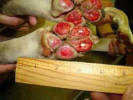
THIS is why you do not walk your dogs on asphalt or concrete
in the summer. If you see someone walking their dogs on
asphalt or concrete, PLEASE educated them and get the pet to
cooler ground. Original post was from Pet Ambulance Victoria
This should be sent to all the veterinarians including the specialists!
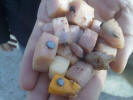
DOG PARK ALERT
We have received two notices.
(1) Nails wrapped in cheese at dog parks in Chicago and
Massachusetts (see pic). (2) from some friends that in
Augusta Maine dog park, antifreeze is being found in doggie
water bowls. Please beware and be careful and PLEASE SHARE
and spread the word

Ever wonder where puppy mill dogs come from? Here's an
example. Many get cooked alive in the sun and freeze to
death in the winter. If you purchase your dog from a pet
store, I can guarantee your "AKC" certified dog came from a
place like this. This one is even better than the ones
I saw in Iowa and Missouri!

Do you recognize she is a Yorkie?
Please do not purchase your pet from a Pet shop, Backyard
breeder or Commercial Puppy Mill.
|
ALL PETS RESCUES
needs your help! |
|
|
 |
|
"The man who rears a
dog must complete what the breeder began..." Max v. Stephanitz; Father of
the German Shepherd Dog
"Fun at the Beach"
 "Fun at
Work"
 "Fun
just hanging out"
|
BLOAT
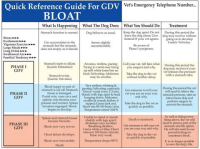
Click chart to view larger version |
This is a real
combination of symptoms that spells out EMERGENCY. These are the classic
symptoms of a condition referred to as "bloat" - a dog that is pacing,
restless and has unproductive attempts to vomit.
This is a common problem in large breed
deep-chested dogs but can also occur in smaller dogs.
Basically what happens is this - the
stomach twists causing the blood supply to the stomach to be compromised
then leads to tissue death. As tissues are damaged, toxins are released
and a sequence of events occurs that if left untreated, leads to death.
If you ever notice these symptoms in
your dog, call your local veterinarian or emergency clinic as soon as
possible.
This is a condition that is fairly
common and often occurs in the evening or nighttime hours. It is also a
very expensive condition to treat.
READ MORE...
Dealing with Excessive Barking
The first step to stopping barking is to understand why it is
happening. Dogs bark for all kinds of reasons, including
anxiety, boredom and/or loneliness. Sometimes they bark just
because it feels good. Luckily, most dogs will respond to
one or other intervention to curtail their barking. Whether you
simply bring an outdoor dog inside or take the time to apply
behavior-modification techniques, you can cause a dog to be less
of a nuisance and to be more socially acceptable. |
Removing Skunk Odor
|
|
No need for the tomato juice. Use a mixture of 10 parts hydrogen
peroxide to 1 part baking soda. Add a dash of degreasing
dishwashing soap and pour into a spray bottle. Spray liberally
over dry coat and allow to air dry. Avoid eyes. Works on other
objects, too! |
Click link below to enjoy the Birding Site
FOR THOSE
WHO LIKE BIRDING
FDA DOG FOOD RECALLS
|
|
|
Epilepsy: Treatable in Dogs
By Drs. Foster & Smith Educational Staff |
 itnessing
a seizure can be one of the most frightening experiences
we, as pet owners, encounter. Not only does it appear as
if the pet is in pain, it also reminds us that we do not
always have control of our pet's health. When we think
of seizures, most of us think of the disease epilepsy.
Epilepsy is the term for a disease that causes recurring
seizures. Seizures are described as a sudden, usually
brief, attack of altered consciousness, motor activity,
or sensory phenomena. Seizures are caused by
uncoordinated firing of the neurons (nerve cells) within
the cerebrum (the front portion of the brain). Seizures
are also called convulsions or "fits." itnessing
a seizure can be one of the most frightening experiences
we, as pet owners, encounter. Not only does it appear as
if the pet is in pain, it also reminds us that we do not
always have control of our pet's health. When we think
of seizures, most of us think of the disease epilepsy.
Epilepsy is the term for a disease that causes recurring
seizures. Seizures are described as a sudden, usually
brief, attack of altered consciousness, motor activity,
or sensory phenomena. Seizures are caused by
uncoordinated firing of the neurons (nerve cells) within
the cerebrum (the front portion of the brain). Seizures
are also called convulsions or "fits."
|
If a patient is in status epilepticus, the
veterinarian will give an injectable drug like
Valium, to stop the seizure. |
Seizures can occur singly or in groups. In general, a
single, brief seizure is not life threatening. When
seizures occur one after another in a group and
continue, this is termed "status epilepticus" or simply
"status." If your pet is in status, a veterinarian
should see him immediately so the seizures can be
controlled. If the seizures are not stopped, the animal
can die from a combination of factors.
It is important to remember that your pet is not
feeling pain because of the seizure. In fact, the nature
of seizures is such that the animal does not know what's
happening. Some pet owners confuse the jerking that
happens when a pet is asleep with a seizure - your pet
can be awakened from a dream, but not from a seizure.
What triggers a seizure?
The actual triggering of a seizure is
unknown, but most patients tend to
seizure during periods of excitability.
Often, the owner will state that the
patient seizures while playing ball or
when the children returned home from
school. Some patients have been known to
seizure while sleeping. Please do not
confuse this with dreaming, where it is
common for the patient to bark or shake
while sleeping. A dreaming patient can
be awakened, but a seizuring patient
cannot. |
|
What you should do if your pet
is having a seizure
- Remain calm.
- Do not get near the animal's
mouth because you may get bitten
inadvertently. Your pet will not
swallow his tongue during a seizure.
- Keep your pet from hurting
himself by removing anything he may
knock over or break during the
seizure.
- Observe your pet and time the
seizure. Call your veterinarian if
your pet's seizure lasts more than
10 minutes or if he is in status.
This is a medical emergency.
|
|
Phases of a seizure
- Pre-ictal phase or
pre-seizure: Often called
the aura, this phase is
characterized by restlessness,
staring into space, unusual
affection-seeking behavior,
salivating, whining, or hiding.
- Ictus: This is
the seizure itself. It is termed
grand mal when the whole body is
involved and the animal is totally
unaware of his surroundings. The
animal typically "paddles" his legs,
jerks, exhibits uncontrollable
muscle activity, salivates
profusely, and often urinates or
defecates. When an animal
experiences a petit mal seizure, he
briefly loses consciousness without
seizuring. The ictal period
generally lasts less than five
minutes.
- Post-ictal phase:
This is the recovery period that
occurs after the seizure. It is
often characterized by
disorientation, lack of
coordination, wandering, or sleeping
for a long period of time. It may
also include temporary blindness.
The post-ictal period generally
lasts for less than an hour, but can
go on for days. During the
post-ictal period it is important to
be there to comfort your pet since
he did not realize what he was
experiencing during ictus.
|
|
Other causes of seizures
Seizures are not always caused by
epilepsy. Other causes include:
- Toxins
- Infections
- Drug overdose
- Trauma to the head (e.g., if a
pet is hit by a car)
- Complications from metabolic
disorders such as diabetes mellitus,
kidney, or liver disease
- Overheating
|
|
One or two seizures, with a long period in between, are
usually nothing to be alarmed about. If there are more
than two seizures, or if you have any concerns, make
sure you call your veterinarian. Even if your pet has
one seizure, be sure to note it and inform your
veterinarian at your pet's next examination.
Epilepsy generally starts in animals 6 months to 5
years of age, usually at 2-3 years.
Epilepsy occurs in all breeds, including mixed
breeds. Epilepsy can be a genetic trait. It can even be
familial, where the epileptic disorder can pass down
through generations within one family. Beagles, German
Shepherds, Irish Setters, Poodles, Saint Bernards,
Springers, Malamutes and Huskies, Cockers, Collies,
Dachshunds, and Golden and Labrador Retrievers are some
of the breeds which have a higher tendency to develop
epilepsy. It is recommended that dogs with epilepsy not
be used for breeding, since this tendency can be
inherited.
Diagnosis and treatment of epilepsy
Your veterinarian will determine if your pet has
epilepsy and the appropriate treatment, if necessary.
Diagnosis
First, your veterinarian will perform a detailed history
of your pet. Certain information from you will help your
veterinarian immensely in making the diagnosis. This
information includes:
- What does your pet look like when he is having
seizures?
- What is the duration of each seizure and how
often do they occur?
- Are there signs that only appear on one side of
your pet (is one side worse than the other)?
- Has your pet had a high fever?
- Has your pet been exposed to any toxins?
- Has your pet experienced any trauma recently or
years ago?
- Is your pet current on vaccinations?
- Has your pet been recently boarded or with other
dogs?
- Has your pet had any other signs of illness?
- Has your pet been running loose in the last
several weeks?
- What and when does your pet eat?
- Has your pet had any behavior changes? Do the
seizures occur in a pattern related to exercise,
eating, sleeping, or certain activities?
- Does your pet show different signs right before
or right after the seizures?
Your veterinarian will perform a physical and
neurological exam and a panel of laboratory tests.
Sometimes x-rays (radiographs) are taken. If the cause
of the seizure cannot be identified, the condition is
diagnosed as idiopathic or primary epilepsy. There is no
test to diagnose epilepsy per se. Our tests simply rule
out other causes of seizures.
Treatment
Generally, treatment is only given if there are multiple
seizures in some sort of pattern. Medication will only
control the duration, severity, or number of seizures.
If necessary, your veterinarian will prescribe a daily
anticonvulsant (seizure-controlling medication), like
Phenobarbital, or Primadone, which are also used for
human epilepsy. For dogs that cannot tolerate other
long-term seizure medications, a drug that is no longer
manufactured commercially, potassium bromide, can be
compounded by Drs. Foster & Smith Pharmacy.
Potassium bromide is an anticonvulsant sometimes
used in conjunction with other anti-seizure medications
as well.
Your veterinarian will most likely have to experiment
to see what dose will work with your pet's particular
condition. Although treatment for epilepsy is lifelong,
once the proper dose is determined, it is not difficult
to treat a pet with epilepsy. |
This site
designed and maintained by Dyan Merkel of
DLM DESIGN STUDIO
|
|
|
|

